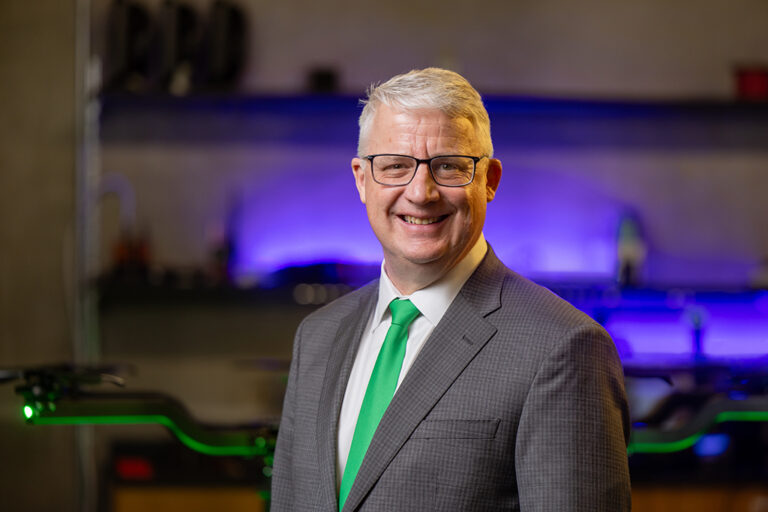Immigration on the mind
UND faculty lecturer Kit Johnson highlights peculiarities and potentials of immigration law

When Kit Johnson sees immigration covered in the news, she sees a vast topic being viewed through a narrow lens.
Wednesday’s latest entry in the UND Faculty Lecture Series provided Johnson, a UND School of Law professor, with a chance to broaden perspectives for the curious public.
Johnson, an expert on immigration law, was chosen to be a faculty lecturer by a UND committee of Chester Fritz Distinguished professors.
“I was shocked, gob smacked,” she said about being selected to deliver a faculty lecture. “To be so junior in my career and be invited is a tremendous honor.”
Teacher’s touch
Johnson used a portion of her lecture to urge the University community to do its best to foster an inclusive campus.
After the most recent presidential campaign, which was wrought with immigration rhetoric, Johnson decided to look at the ways UND’s international students felt about life abroad in the United States. From March to October of 2017, she met with 45 international students from the six populated continents — graduate and undergraduate.
During her meetings, she discovered that students had a specific range of anxieties about their status in America. She listed “travel ban” efforts, worries of discrimination and not feeling welcome, and gun violence as principle concerns. But, on the flipside, she said, students coming to UND find a wealth of opportunity whether its top-notch aviation programs, low-tuition law school or maximizing their education while getting a taste of American life.
“It is amazing that UND has such a truly vibrant international community — that there was such a range of students to meet,” Johnson remarked, adding that their presence is an important aspect of campus life.
“International students are a genuine gift. Their presences in our classrooms elevate us to think about what’s happening on an international stage. They allow us to build friendships that cross nations — friendships that will help the United States long-term.”

Economic impact
Esoteric work visas, the role hospitals play in deportation and nations without borders were among the topics discussed Wednesday.
It took the form of vignettes — condensed stories — addressing separate areas of the law in which she’s written articles and papers. Her interest in how the government handles immigration largely intersects with the roles industries play in lobbying for change.
“When people talk about law, there’s a sense that the law is about court,” Johnson said. “Most of the work that I do is not about court at all but about legislation and Congress. Congress makes the laws, and I’m not sure we always focus on that.
“One of my favorite ideas is that, ‘The law doesn’t work for me, so why don’t I go out and write a law.’”
That’s exactly what Disney did in the 1980s when trying to work around a cultural exchange visa meant for education. In order to get workers from specific countries to work at their World Showcase attraction at Walt Disney World’s Epcot Center, they spearheaded an entirely new visa program.
It’s an exchange that’s made the company millions in revenue and saved labor expenses. Multiply that a few times, and you have viable economic impact, she said.
Johnson noted that information in the media tends to cover individuals who are undocumented, but her work “tends to focus on people who are present lawfully.”
She also stressed that while the public tends to look at immigrants as permanent residents, regardless of legality, that doesn’t reflect the reality of immigration statistics.
Each year, she said, for every 1 million that come to stay permanently, about 40 million arrive on a much shorter-term basis.
Approachable lecture
Johnson made sure to make her lecture “less in the weeds, more on the stories,” after being impressed by past University Faculty lecturers.
That doesn’t mean she wasn’t ready to take on in-depth, technical legal questions.
“I could talk about it all day,” she laughed, regarding her fascination.
When asked what she finds most intriguing, the question received a simple, “Everything.”
She took questions from her audience on chain migration, President Trump’s resort staff at Mar-a-Lago, and how to better serve international students.
Dean Debbie Storrs of the College of Arts & Sciences presented Johnson with a plaque commemorating her lecture — the 230th since the series began in 1954. Storrs found inspiration in how Johnson presented the role of immigrants in American and university culture.
“This is what the University is about,” Storrs said. “Engaging the community, sharing ideas, questioning practices and hearing solutions that make us think more critically about the world we’re living in.”
The Faculty Lecture Series recently made its return to campus by efforts from Chester Fritz Distinguished Professors and funding from the Offices of the President and Provost. The next iteration of the series is set for March 28 when John Fitzgerald of kinesiology & public education department, presents “Fitness is not just for athletes, it’s for your health.”



